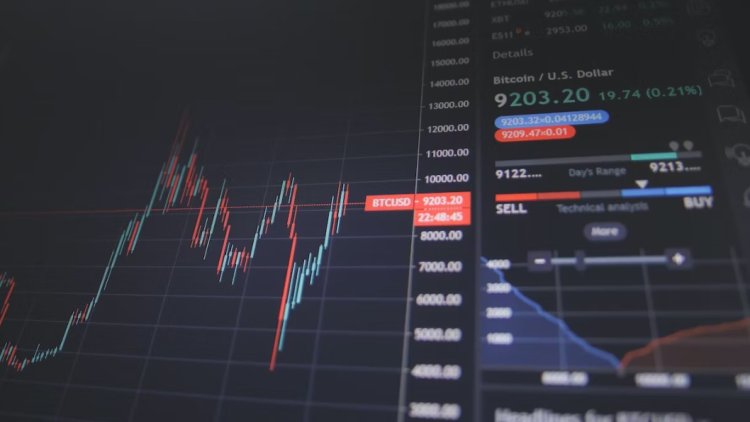Financial Instruments: Key Players in Financial Markets
Demystify the financial game! Unravel the secrets of stocks, bonds, currencies, derivatives, and more. Understand their roles and master the complexities of financial markets

Unveiling Financial Markets
Financial markets, including the stock market and securities market, are essential pillars of the global economy. They serve as the backbone of investment strategies and have a substantial impact on economic trends. These markets provide a platform for buying and selling financial instruments such as stocks, bonds, commodities, and derivatives.
Importance of Financial Markets: "Financial markets are the driving force behind investment decisions and economic growth," says financial expert John Smith.
-
They enable individuals, businesses, and governments to raise capital by issuing securities.
-
Investors can trade a wide range of financial instruments, allowing for diversification and risk management.
-
The performance of financial markets reflects the overall health of the economy and influences global economic trends.
Understanding the dynamics of financial markets is crucial for comprehending how they shape the global economy.
The Basics of Financial Instruments
Financial instruments are the cornerstone of investment strategies, encompassing a wide array of assets that individuals and entities can invest in. These instruments include stocks, bonds, commodities, and derivatives, each serving a unique purpose in the financial markets.
Understanding financial instruments
Financial instruments represent various types of financial assets that can be traded. They are essentially contracts between parties, which can be categorised as cash instruments or derivative instruments. Cash instruments include loans, deposits, and securities such as stocks and bonds. On the other hand, derivative instruments derive their value from an underlying asset or index and include options and futures contracts.
Types of Financial Instruments
-
Equities: Equities refer to ownership shares in a company, also known as stocks. When investors purchase equities, they become partial owners of the company and may benefit from dividends and capital appreciation.
-
Fixed Income Securities: Fixed income securities, such as bonds and treasury bills, represent debt obligations where the issuer promises to pay a set amount of interest over a specified period.
-
Foreign Exchange: This category includes currency pairs that can be traded in the foreign exchange market.
Understanding these different types of financial instruments is essential for making informed investment decisions and navigating the complexities of financial markets.
Influence on Global Economic Trends
Financial instruments play a pivotal role in shaping global economic trends and influencing the overall stability and growth of the world economy. Their impact extends to both economic growth and international trade, making them key players in the dynamics of the global financial landscape.
Impact on Economic Growth
The influence of financial instruments on economic growth is profound. As individuals, businesses, and governments utilise these instruments to raise capital, it fuels investment in various sectors of the economy. This influx of capital leads to increased productivity, job creation, and overall economic expansion. Moreover, the availability of diverse financial instruments allows for efficient allocation of resources, which further contributes to sustained economic growth.
Financial Analyst Mary Johnson: "The availability of diverse financial instruments not only fosters investment but also supports innovation and entrepreneurial ventures, driving economic progress."
Role in International Trade
Financial instruments also play a significant role in facilitating international trade and investment. The ability to hedge against currency fluctuations using derivatives or access financing through bond issuances enables businesses to engage in cross-border transactions more effectively. Additionally, foreign exchange markets provide a platform for exchanging currencies, which is essential for conducting international trade.
-
Currency pairs traded in the foreign exchange market allow businesses to manage currency risk when engaging in international transactions.
-
Bond markets enable governments and corporations to raise funds internationally by issuing bonds denominated in different currencies.
This seamless facilitation of international trade through various financial instruments contributes to shaping international economic patterns and fostering global economic integration.
Exploring investment strategies
Diversification and risk management
Diversification and risk management are fundamental aspects of investment strategies, and financial instruments play a crucial role in achieving these objectives. By investing in a variety of assets across different industries or geographic regions, investors can spread their risk and reduce the impact of any single investment's performance on their overall portfolio.
Financial Advisor Sarah Parker: "Diversifying your investment portfolio using various financial instruments can help mitigate the impact of market volatility and specific asset risks."
Diversification can be achieved by investing in different types of financial instruments, such as stocks, bonds, commodities, and currencies. Each type of instrument carries its own level of risk, and combining them strategically can lead to a more balanced and resilient portfolio.
Additionally, financial instruments offer tools for managing risk through derivatives such as options and futures contracts. These instruments allow investors to hedge against potential losses by establishing predetermined prices at which they can buy or sell assets in the future.
Long-term vs. short-term investments
Different financial instruments cater to varying investment horizons, offering opportunities for both long-term and short-term strategies. Equities, for example, are often considered suitable for long-term investments due to their potential for capital appreciation over time. On the other hand, fixed-income securities like bonds may provide stable returns over shorter periods.
Investment Analyst David Nguyen: "Investors should align their choice of financial instruments with their investment plans, considering factors such as liquidity needs, risk tolerance, and desired holding period."
Understanding the characteristics and dynamics of different financial instruments is essential for developing effective portfolio strategies that align with an investor's specific goals and preferences.
Importance of Market Analysis
Market analysis holds significant importance in the evaluation of financial instruments and market trends. It encompasses fundamental and technical approaches, providing valuable insights for investors and market participants.
Fundamental vs. Technical Analysis
Fundamental analysis involves assessing the intrinsic value of financial instruments by examining economic factors, industry trends, and company-specific data. This approach focuses on determining the underlying worth of an asset to make informed investment decisions.
On the other hand, technical analysis revolves around studying historical price movements and market statistics to forecast future price trends. It involves analysing charts, patterns, and trading volumes to identify potential opportunities in the market.
Both fundamental and technical analyses are essential tools for understanding the dynamics of financial markets and making well-informed investment decisions.
Market research and decision-making
Thorough market research is crucial for decision-making in financial markets. It involves gathering data, analysing trends, and evaluating various factors that can impact the performance of financial instruments. Informed decisions are based on comprehensive market analysis, which helps investors navigate the complexities of the financial landscape with confidence.
By conducting thorough market research, investors can gain a deeper understanding of market dynamics, identify potential risks and opportunities, and make strategic investment decisions aligned with their financial goals.
The importance of market analysis cannot be overstated, as it serves as a guiding light for investors seeking to capitalise on opportunities while managing risks effectively.
Players in Financial Markets
Financial markets are dynamic ecosystems shaped by the participation of various stakeholders, each playing a distinct role in the functioning and development of these markets. Understanding the key players in financial markets is essential for comprehending the intricate interplay of supply, demand, and investment dynamics.
Role of Investors
Investors are pivotal market participants whose actions significantly influence the demand and supply of financial instruments. Their decisions to buy, sell, or hold various assets directly impact market liquidity and pricing. Individual investors, institutional investors, and investment funds collectively contribute to the overall trading volume and price discovery in financial markets.
Market Analyst Laura Thompson: "Investors' behaviour often reflects market sentiment and can drive substantial movements in asset prices."
The diversity of investors, ranging from retail traders to large institutional funds, brings a spectrum of perspectives and investment horizons to financial markets. This diversity contributes to market efficiency by incorporating a wide range of expectations and risk appetites.
Influence of Financial Institutions
Financial institutions such as banks, investment firms, and brokerage houses play a significant role in the trading and distribution of financial instruments. These institutions act as intermediaries between investors seeking to buy or sell securities, facilitating transactions while providing essential services such as custody, clearing, and settlement.
Financial Economist Mark Davis: "Financial institutions serve as crucial conduits for capital flows within the financial system, connecting savers with borrowers and investors with opportunities."
Additionally, financial institutions engage in market-making activities by offering bid-ask prices for various instruments, thereby enhancing market liquidity. Their research capabilities also provide valuable insights to both individual and institutional investors when making informed investment decisions.
The collective actions of investors and financial institutions shape the vibrancy and resilience of financial markets while contributing to their overall efficiency.
Impact on GDP Growth
Financial instruments play a significant role in driving overall economic output and fostering GDP growth within a nation. The presence of diverse financial instruments contributes to the efficient allocation of capital, which, in turn, fuels economic expansion and stimulates the Gross Domestic Product (GDP) growth.
Contribution to Economic Output
The utilisation of financial instruments directly impacts the economic output of a nation by channelling funds into productive investments across various sectors. When individuals and entities invest in financial instruments such as stocks, bonds, and commodities, they are essentially directing capital towards businesses and projects, thereby fostering economic activity. This infusion of capital leads to increased production, job creation, and overall economic expansion. As a result, the collective contribution of financial instruments enhances the overall economic output of a nation.
Relationship with Economic Indicators
The performance of financial instruments is intricately linked to key economic indicators such as GDP and inflation. A robust performance in financial markets often correlates with positive GDP growth, reflecting the vitality of investment activities and capital deployment within an economy. Moreover, fluctuations in the prices of financial instruments can serve as leading indicators for shifts in economic trends. For instance, rising stock prices and heightened trading volumes may signal optimism about future economic prospects.
Understanding these relationships between financial instruments and economic indicators provides valuable insights into the broader macroeconomic landscape. It enables policymakers, investors, and analysts to gauge the health of an economy while identifying potential opportunities or risks that may arise from movements in financial markets.
Deciphering Financial Markets
Navigating the intricacies of financial markets and understanding the profound impact of financial instruments is crucial for comprehending the dynamics of the global economy. The interplay between various financial instruments, including stocks, bonds, and derivatives, shapes the functioning of securities markets and stock markets, influencing investment decisions and economic trends.
To effectively decipher financial markets, individuals and entities must grasp the fundamental role played by these markets in driving economic growth and fostering international trade. Moreover, gaining insights into investment strategies, market analysis techniques, and the key players involved in financial markets is essential for making informed decisions and capitalising on opportunities while managing risks effectively.
By delving into the complexities of financial instruments and their influence on financial markets, market participants can enhance their understanding of global economic trends and position themselves to navigate the ever-evolving landscape with confidence.
If you don't want to go through the stress of Forex but want to make money, join our Forex Managed Account Programme (links below).
TradeFxP Features
If you choose to be a self-employed retail trader, here are a few things we offer:
-
The best trading platform
-
No Requotes
-
Lowest Spreads
-
High-level liquidity
-
Interbank connectivity
-
Pure STP/DMA/ECN
-
Free signals
-
Best support
-
Crypto Wallet and withdrawals and deposits (USDT)
-
Robust CRM
-
TradeFxP wallet
-
Once you click withdrawal
-
Multiple payment options
-
Local offices to walk into
-
Free VPS
-
Free video chat and virtual meetings
-
And many more...
If you choose to be a part of our managed account programme,
-
All of the above +
-
1-2% Daily Profits
-
High-level risk management
-
Capital protection
-
Only 30% of the capital was used.
-
Negative balance protection
-
Our fee is from the profits only.
-
Monthly profit withdrawal
-
Wallet system: use it like PhonePe or Google Pay.
-
Crypto wallet and withdrawals/deposits (USDT)
-
Live monitoring
-
MyFxbook Live Monitoring
-
Copy Trading
-
And many more...
Optional: If you do not withdraw your profits for 2 months, our system will use those profits to trade and will keep your 100% capital safe and secure for margin purposes. This is optional, and if you choose not to be a part of it, you can withdraw your profits from the first month itself.
Why 1-2% daily? Can't your managed Forex account earn more?
Yes, we can! Remember: greed may be good in the beginning, but in the end, it will destroy everything. You and I know that! Many droplets make an ocean! Join the Managed Account Programme and sit back for six months, then look at your account. You'll see that our strategy is good and the best. Do you know what I mean?
If you choose to be a part of us as an introducing broker (IB) or channel partner,
-
Industry-best rebates
-
Local office support
-
Staff support
-
Marketing support
-
Marketing materials
-
And many more...
Having said that,
You can join our Forex Managed Account programme and earn 1-2% profits daily. See for yourself by clicking the below link.
Have a great journey, and may you catch some big waves on your way to prosperity!
1. To read why you should be with us, click here.
2. To open an account, click here.
3. To see our regulation certificate, click here.
4. To see our news with the IFMRRC, click here.
5. For claims, click here.
6. For the main site, click here.
7. For blogs and articles, click here.
8. Main Website:www.TradeFxP.com



 admin
admin 










